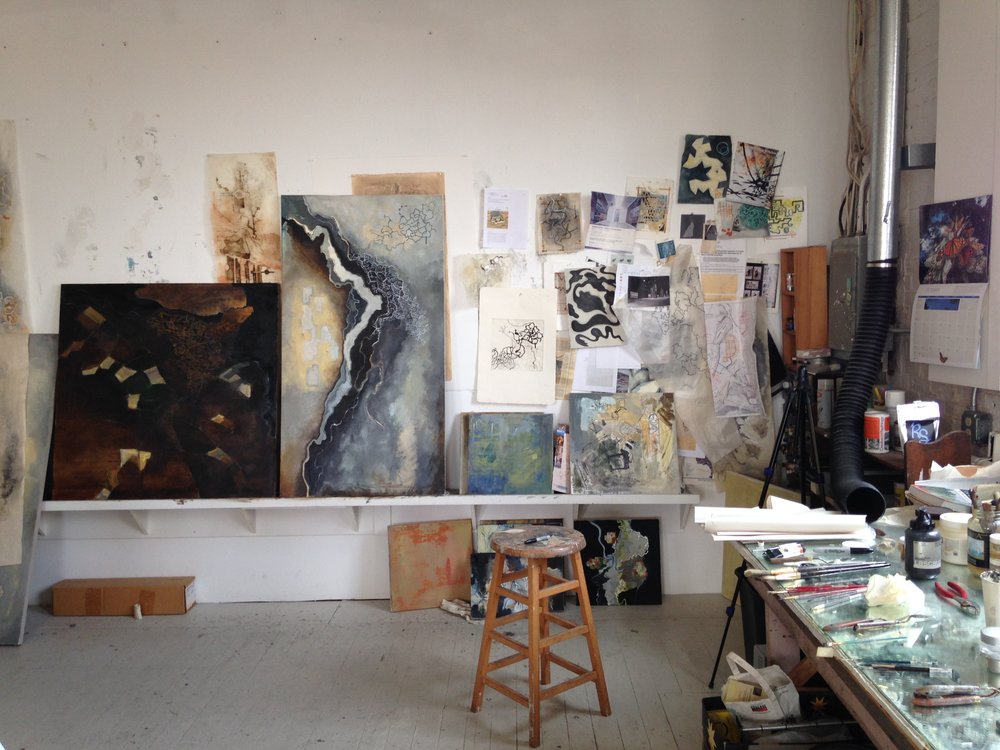Hidden Worlds, Agile Minds, and Amazing Ideas: Studio Chat with Alison Hildreth
April 7, 2017
Rachael M Rollson, Cohort ’16
Alison Hildreth, artist and recent recipient of an honorary doctoral degree from IDSVA, graciously speaks about the intersections of art, philosophy, and activism.
.jpeg)
[on Science and Imagination]
There’s a whole thing about what we don’t see that’s in the Earth, just the microbes and the fungi and mycelium: this whole underground network that’s rumbling away. We don’t see it and I kind of worry that we’ll destroy it before we understand what it is - there’s so much that runs things that we don’t see. We are sort of a failed experiment. I don’t think we are doing well. We can do better. We have the knowledge to do better but I’m afraid, what is the phrase, “Ah, but a man’s reach should exceed his grasp or what’s a heaven for?” (Robert Browning).

There’s this Spanish artist and neuroscientist - his name was Santiago Ramon y Cajal, he was very interested, over 100 years ago, in how the brain works and he did these drawings; I love these drawings. I just came upon that and thought, “Ooh!” But the fact of the matter is that a lot of what he thought then is proving now to be true. People have these insights that are way ahead of their time. Some of these people that come up with these absolutely amazing ideas, you think Einstein, “How could he possibly thought of wave particles?!” I’m thinking of that extraordinary genius mind that pulls everybody ahead, but everybody doesn’t know that new plateau. They don’t necessarily understand it. I think in some ways it’s wonderful; the whole idea of understanding more of the universe is so exciting. It is just intriguing, isn’t it, what we’re able to do now? I couldn’t invent the wheel! We’re living in the benefit of so many brilliant ideas.
.jpeg)
[on Political Activism]
I find that precarious terrain - to get that into my work. I’d rather have it be subterranean, not overtly political because I kind of feel as if I don’t want to anchor things in quite that way. But it’s there because I am totally interested in what is going on. All those threads, they all come together, one doesn’t exist without the other. And why things happen; why is this happening now? And what is going along simultaneously with literature and the arts, and people’s life choices for what they want to do. I think it’s a very interesting generation, the generation that’s coming up.
[on Artists in Philosophy]
It’s very intense, I can see that. And I thought, you know, somehow, it’s like trying to put a round peg in a square hole, because you’re trying - and this happened with [my] students over and over again and I would say to them, “What are you really interested in?” because they were trying to make Derrida fit into their work and become apparent in their work, and it was impossible. But it’s good training for the mind. I think perhaps it makes the mind more agile and more understanding of the whole swirl of critical thinking that went around different eras in time. I’m not sure Picasso ever paid too much attention to it. We just don’t know, but they are two fields [art and philosophy] that are happening at the same time.
.jpeg)
[on being a part of the IDSVA family]
I really loved the time in Spannocchia as a visiting artist in 2016, because I felt it was a congregation of people with such different interests all coming together and sharing a pool of ideas.
